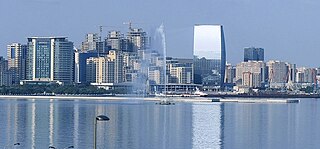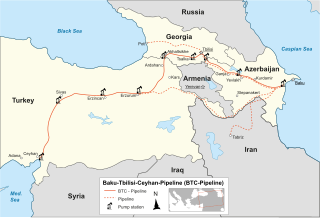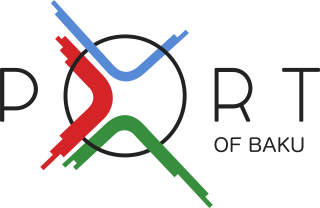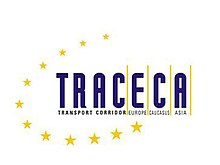
The economy of Azerbaijan is highly dependent on oil and gas exports, in particular since the completion of the Baku-Tbilisi-Ceyhan Pipeline. The transition to oil production in the late 1990s led to rapid economic growth over the period 1995–2014. Since 2014, GDP growth has slowed down substantially.

The United Nations Economic Commission for Europe is one of the five regional commissions under the jurisdiction of the United Nations Economic and Social Council. It was established in order to promote economic cooperation and integration among its member states.

The transport in Azerbaijan involves air traffic, waterways and railroads. All transportation services in Azerbaijan except for oil and gas pipelines are regulated by the Ministry of Transportation of Azerbaijan Republic.

The Baku–Tbilisi–Ceyhan (BTC) pipeline is a 1,768 kilometres (1,099 mi) long crude oil pipeline from the Azeri–Chirag–Gunashli oil field in the Caspian Sea to the Mediterranean Sea. It connects Baku, the capital of Azerbaijan and Ceyhan, a port on the south-eastern Mediterranean coast of Turkey, via Tbilisi, the capital of Georgia. It is the second-longest oil pipeline in the former Soviet Union, after the Druzhba pipeline. The first oil that was pumped from the Baku end of the pipeline reached Ceyhan on 28 May 2006.

The GUAM Organization for Democracy and Economic Development is a regional organization of four post-Soviet states: Georgia, Ukraine, Azerbaijan, and Moldova.

The Nagorno-Karabakh conflict was an ethnic and territorial conflict between Armenia and Azerbaijan over the region of Nagorno-Karabakh, inhabited mostly by ethnic Armenians until 2023, and seven surrounding districts, inhabited mostly by Azerbaijanis until their expulsion during the 1990s. The Nagorno-Karabakh region was entirely claimed by and partially controlled by the breakaway Republic of Artsakh, but was recognized internationally as part of Azerbaijan. Azerbaijan gradually re-established control over Nagorno-Karabakh region and the seven surrounding districts.

The Trans-Caspian Gas Pipeline is a proposed subsea pipeline between Türkmenbaşy in Turkmenistan, and Baku in Azerbaijan. According to some proposals it would also include a connection between the Tengiz Field in Kazakhstan, the Sangachal Terminal in Baku, and Türkmenbaşy. The Trans-Caspian Gas Pipeline project would transport natural gas from Turkmenistan and Kazakhstan to European Union member countries, circumventing both Russia and Iran. It would do this by feeding the Southern Gas Corridor. This project attracts significant interest since it would connect vast Turkmen gas resources to major consumers Turkey and Europe.
The Baku Initiative is an international initiative of the European Union. It is a policy dialogue on energy and transport cooperation between the European Union, Turkey, and the former Soviet republics, undertaken as part of the INOGATE energy and TRACECA transport programmes.

Zviad Kvatchantiradze is a Georgian parliamentarian and diplomat. Chairman of the EU-Georgia Parliamentary Committee on Association. First Vice Chairman of the Committee on Foreign Relations of the Parliament of Georgia. Leader of Majority. Member of the Parliamentary Assembly of the Council of Europe (PACE). He was formerly Consul General of Georgia in Istanbul, Turkey, from 2005-2009 and Secretary-General of the TRACECA Intergovernmental Commission from 2000 to 2004. Holds a rank of Ambassador Extraordinary and Plenipotentiary since 2001.

The Baku–Tbilisi–Kars (BTK), or Baku–Tbilisi–Akhalkalaki–Kars railway (BTAK), is a railway connecting Azerbaijan, Georgia and Turkey, which became operational on 30 October 2017 following several years of delays. The project was originally due to be completed by 2010, but was delayed to 2013, 2015, 2016, and, following a fifth trilateral meeting in February 2016, foreign ministers of the three countries announced that the railway would finally be completed in 2017.

The Absheron Peninsula is a peninsula in Azerbaijan. It is the location of Baku, the biggest and the most populous city of the country, and also the Baku metropolitan area, with its satellite cities Sumqayit and Khyrdalan.

The Republic of Azerbaijan and the European Union (EU) have maintained a positive relationship through the years and have become more closely linked since 1991. Azerbaijan is currently part of the European Neighborhood Policy, the Eastern Partnership and the Council of Europe. The EU is the largest foreign grant donor to and investor in Azerbaijan, both in the government sector and civil society, making available over 600 million EURO of bilateral EU assistance since 1992.

Rail transport in Azerbaijan is operated by the national state-owned railway company Azerbaijan Railways. The railway network consists of 2,918 km (1,813 mi), its gauge is 1,520 mm, 815 km (506 mi) are double track and 1,272 km (790 mi) are electrified at 3 kV (3,000 V) DC.

The Organization of Turkic States (OTS), formerly called the Turkic Council or the Cooperation Council of Turkic Speaking States, is an intergovernmental organization comprising all but one of the internationally recognized Turkic-speaking sovereign states: Azerbaijan, Kazakhstan, Kyrgyzstan, Turkey, and Uzbekistan; while Hungary and Turkmenistan are observers. Its overarching aim is promoting comprehensive cooperation among the Turkic peoples. First proposed by Kazakh president Nursultan Nazarbayev in 2006, it was founded on 3 October 2009 in Azerbaijan's Nakhchivan. The General Secretariat is located in Turkey's Istanbul.

Port of Baku is a sea port located in the Bay of Baku, on the coast of city of Baku, Azerbaijan. The main entrance faces the Neftchiler Avenue.

The Ministry of Energy of Azerbaijan Republic is a governmental agency within the Cabinet of Azerbaijan in charge of regulating the activities in the industry production and energy sector of Azerbaijan Republic. The ministry is headed by Parviz Shahbazov.
The Ashgabat agreement is a multimodal transport agreement between the governments of Kazakhstan, Uzbekistan, Turkmenistan, Iran, India, Pakistan, and Oman for creating an international transport and transit corridor facilitating transportation of goods between Central Asia and the Persian Gulf. The agreement came into force in April 2016. Ashgabat in Turkmenistan is the depository state for the agreement.
The overall investment climate in Azerbaijan continues to grow despite of significant challenges remain. Over the recent years, the country has made efforts to integrate more fully into the global marketplace and attract foreign investment.

Azerbaijan is one of the birthplaces of the oil industry and its history is linked to the fortunes of petroleum, with pipelines used from the late 19th century. The total length of the main pipeline in Azerbaijan is 4,600 kilometres (2,900 mi)

The Zangezur corridor is a concept for a transport corridor which, if implemented, would give Azerbaijan unimpeded access to Nakhchivan Autonomous Republic without Armenian checkpoints via Armenia's Syunik Province and, in a broad sense, for the geopolitical corridor that would connect Turkey to the rest of the Turkic world thereby "uniting it". The concept was not part of the 2020 Nagorno-Karabakh ceasefire agreement but was introduced to geopolitical lexicon later by Ilham Aliyev. It has since been promoted by Azerbaijan and Turkey, while Armenia has steadily objected to it, asserting that "corridor logic" deviates from the ceasefire statement, and that it is a form of propaganda.

















